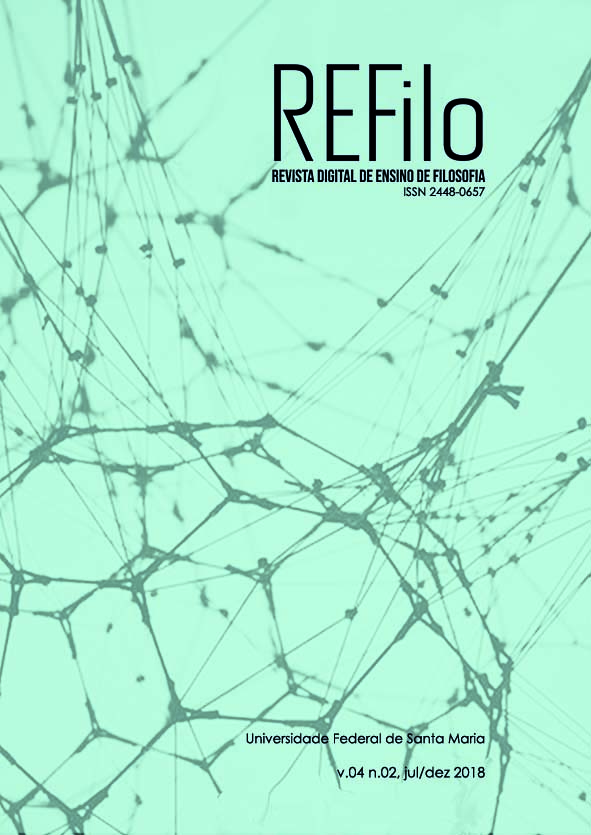Reflections on Philosophy as a curricular component of basic Education
DOI:
https://doi.org/10.5902/2448065732968Keywords:
Education, Philosophy teaching, Critical TheoryAbstract
This paper proposes an analysis about philosophy in school education. Its methodology is based on the Critical Theory proposed by Theodor Adorno and Max Horkheimer, which is used in the construction of an expository web where the historical addresses of the philosophy teaching are brought as supporting points to create the fissures of contradiction involving the relation between the knowledge of philosophy and the role given to it in Brazilian formal education. Our goal is to problematize the horizon of such philosophy teaching using its historicity in the exercise of the elucidative thinking. That is why the contradiction points brought by the historical analysis addressing the time-space relation and the modelling of the identifying elements of the teaching of philosophy serve as conducting threads that make it reasonable to see this horizon in its potential gaps. The conclusion of this article, consistent with its methodological approach, does not advocate a formula of salvation, quite the opposite, it presupposes to make audible a voice incarnated of several voices on the subject of teaching philosophy as a curricular component, believing that open dialogue is already part of the philosophical exercise of thinking about itself as school content necessary for a collective project of democratic society.Downloads
References
ADORNO, Theodor W. Minima Moralia. São Paulo: Ática, 1992.
ADORNO, Theodor W. Dialética Negativa. Rio de Janeiro: Jorge Zahar, 2009.
ADORNO, Theodor W. Educação e Emancipação. São Paulo: Paz e Terra, 2012.
BRASIL, MEC/SEB. Parâmetros curriculares nacionais - Parte IV - Ciências Humanas e suas Tecnologias, Ensino Médio. Brasília: MEC/SEB, 2000.
BRASIL, MEC/SEB. Orientações Educacionais Complementares aos Parâmetros curriculares nacionais - Ciências Humanas e suas Tecnologias. Brasília: MEC/SEB, 2006.
CABRERA, Julio. Diário de um Filósofo no Brasil. Ijuí: Unijuí, 2010.
GALO, Sílvio, KOHAN, Walter Omar . Crítica de Alguns Lugares-Comuns ao se Pensar a Filosofia no Ensino Médio. In GALO, Sílvio, KOHAN, Walter Omar (Org). Filosofia no Ensino Médio. Petrópolis, RJ: Vozes, 2000, p. 174-205.
HORN, Geraldo B. Apresença da Filosofia no Curriculo do Ensino Médio Brasileiro: uma Pespectiva Hiatórica. In GALO, Sílvio, KOHAN, Walter Omar(Org). Filosofia no Ensino Médio. Petrópolis, RJ: Vozes, 2000, p. 17-33.
HORKHEIMER, Max. Eclipse da Razão. São Paulo: Unesp, 2015.
HORKHEIMER, Max. Filosofia e a Teoria Crítica. In. BENJAMIN, walter. HORKHEIMER, Max. ADORNO, Theodor W. HABERMAS, Jurgen. Textos Escolhidos. São Paulo: Abril Cultural, 1983, p. 155-161.
HORKHEIMER, Max. Teoria Tradicional e Teoria Crítica. In. BENJAMIN, walter. HORKHEIMER, Max. ADORNO, Theodor W. HABERMAS, Jurgen. Textos Escolhidos. São Paulo: Abril Cultural, 1983, p. 117-154.
KOHAN, Walter Omar. O Ensino da Filosofia Frente à Educação como Formação. In GALO, Sílvio. CORNELLI, Gabriele, DANELON, Marcio (org). Filosofia do Ensino de Filosofia. Petrópolis, RJ: Vozes, 2003, p. 33-49.
RODRIGO, Lidia M. Filosofia em sala de Aula: teoria e prática para o ensino médio. Campinas, SP: Autores Associados, 2009.
SEVERINO, Antônio J. O Ensino da Filosofia: Historicidade do Conhecimento e Construção da Aprendizagem. In GALO, Sílvio. CORNELLI, Gabriele, DANELON, Marcio (org). Filosofia do Ensino de Filosofia. Petrópolis, RJ: Vozes, 2003, p. 50-59.








